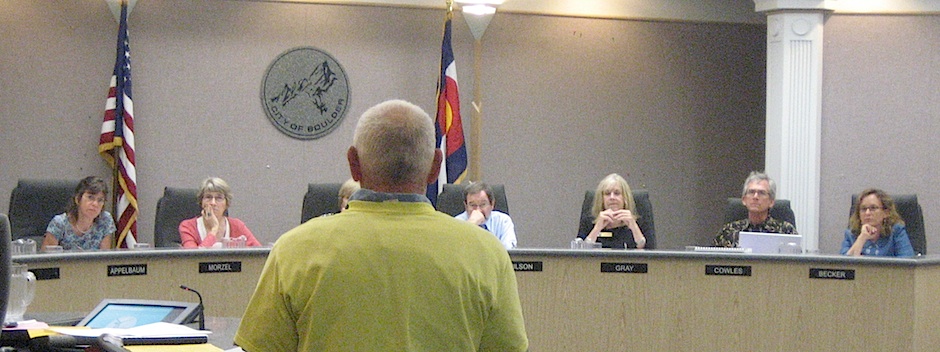Fixing our ailing City government
Eric Karnes | Aug 5, 2010

This article is the first in a series
See Part Two, Aug 26, 2010: How Boulder is governed: time for a change?
It’s budget time at the Boulder Municipal Building. Before your eyes glaze over and you move on to another article, please remember that you, dear reader, pay the taxes and fees that operate the City of Boulder government. If you care about how your money is spent, you need to look behind the scenes at the flawed process. Let me raise the curtain a bit for you.
On July 27 the Boulder City Council conducted a study session on the 2011 operating budget and the 2011 to 2016 capital improvements budget. The City staff presented a dog-and-pony show on a new system developed by consultants to help set budget priorities. The show was all too typical: wow the Council with fancy footwork, focus on program costs but ignore administrative costs. And, guess who recommended the priorities for City programs under this whiz-bang super-duper Excel spreadsheet program created by yet another consultant? Staff did, not the public.
Council members were an audience at the show, not the actors. Under the current process there is little opportunity for Council to delve deeply into the specifics of the budget or to order priorities. The City Manager proposes her budget and Council jumps through the hoop after asking a few questions.
Problem is structural
Much of the problem involves the structure of Boulder’s municipal government. With the City Manager form of government the staff handles the day-to-day operations of the city under the policies established by the elected City Council. In reality the Council members, underpaid and overworked, with few tools to effectively monitor the staff, simply defer to the City Manager and her staff. The lack of oversight becomes very evident when staff makes mistakes and the public comes knocking on Council’s door for answers.
This isn’t to say that City staff is inept or corrupt. In all my experience with City staff members I’ve found them to be generally competent, always honest, frequently imaginative but often with their own agendas. There’s nothing sinister here: someone has to step in to fill the leadership vacuum, and the staff sees their role as effectively being in charge, humoring the citizenry and drowning the Council in minutiae. Council is often encouraged to take detours off into silly distractions, like chasing naked pumpkin runners, criminalizing homeless people sleeping in parks, creating overreaching “rules of conduct” to limit public involvement at Council meetings, and over-regulating medical marijuana patients.
This is also not to say that City Council members are ignoring their responsibilities. I know each member of Council and all of them mean well and work hard and spend lots of time on City business. They just don’t take control, deferring too much to the staff. Asking questions isn’t enough.
Council gets polite answers
You could see this situation at play during the July 27 study session. Council members posed some issues and staff generally was courteous, condescending and unresponsive. Give us your input, was the reply, and we’ll consider your suggestions. But, under the City Charter, Council is responsible to the citizenry and they should instruct staff, not just make vague suggestions. The July 27 meeting was not exactly local democracy at its finest.
The problem isn’t the people in the system, but the system itself. The City Manager form of government is designed to keep control out of the hands of the public. It is essentially unaccountable and undemocratic.
So, how can the people of Boulder (and their elected representatives) take control over setting priorities as exemplified in the budget process? Here are a few suggestions:
1. Vote Council members out of office?
No! Even those members of Council with whom I sometimes disagree are competent and diligent. We are fortunate to have them willing to serve in a tough job. I might vote for some challengers in 2011 but, all in all, the nine men and women who comprise our current City Council do yeoman’s work. Any changes next year should be selective and for good reason. The shrill cry of the Tea Party conservatives to “throw the bums out” doesn’t resonate in Boulder.
2. Give Council the tools
Boulder City Council members are treated like second-class citizens in local government. They have no office, no individual laptop computers or even a single staff member to help them do the necessary research on City issues and to respond to the volume of emails and phone calls they receive every day. Yet they catch hell from the citizens when things go wrong, and rightfully so.
The City budget should be amended to move some administrative and personnel funds to an Office of City Council. Funding would not be excessive, just enough to provide the support needed for Council to make better-informed decisions. Ultimately we ought to raise Council’s miniscule salaries, but that should come after more important community needs are met.
3. Get into the budget details
Council should appoint an independent Citizens Budget Commission to look in great detail at all aspects of the City budget. This shouldn’t be another City Manager-appointed cheerleading squad but rather a diverse group of citizens with no allegiances or ties to staff. Council should instruct staff to cooperate with the commission members by answering their questions and providing them accurate and timely data on revenues and expenditures by line item.
Council should give the commission instructions to report back with their questions and suggestions before City staff begins work on the 2013 budget. That period of almost two years should include ample opportunities for public comment during the commission’s meetings. After receipt of the commission’s report, Council should conduct a series of study sessions and public hearings to determine the actual priorities for the City of Boulder. Council should then instruct the City Manager to prepare a zero-base budget justifying every individual budget item and how those expenditures will help implement the citizens’ priorities.
Council should look carefully at internal City operations, not just programs that serve the general public. All too often staff floats trial balloons about cutting popular services like libraries and parks, only to have an angry citizenry swamp Council with phone calls and emails. Never do those trial balloons address internal staff and administrative costs. Instead, Council should be asking some really basic questions like:
- What are the City of Boulder’s staff levels, number of managers, salary ranges and benefit packages and how do they compare with “peer” cities like Fort Collins, Santa Fe, Eugene, Chapel Hill, Athens, Burlington and Ann Arbor, for example.
- What are the City’s annual expenditures for furniture, equipment, vehicles, dues, subscriptions, travel, meals, conferences and consultants? What’s the trend been on these costs in recent years?
- In times of severe budgetary constraints should the City consider initiating periodic unpaid staff furloughs (perhaps one day a month) and salary cuts for senior management positions?
- Why does the City spend hundreds of thousands of dollars on business incentives and subsidies through its “economic vitality” program. Shouldn’t the parts of the private sector that benefit most from growth (like the chamber and the Realtors) fund that type of business recruiting and marketing instead of the taxpayers?
4. Break the Mold
An old saying among some management theorists is “if it ain’t broke, break it.” That sounds a bit wacky until you consider the philosophy behind it. Organizations, public or private, should always be questioning the orthodoxy and common wisdom and looking at alternatives and options. The City of Boulder should follow that philosophy.
For example, why doesn’t the City of Boulder look to consolidate some of its operations with Boulder County and perhaps some other municipalities? Examples abound, including some police services (crime lab and SWAT team come to mind), parks and recreation, planning and particularly internal functions like purchasing, building maintenance and motor pools.
Boulder County benefits from using trained volunteers to fill some positions. Most of the emergency services agencies in the county, for example, are all, or part, volunteer, including the Boulder Emergency Squad, the local Civil Air Patrol squadron, Rocky Mountain Rescue, Front Range Rescue Dogs and the Longmont Emergency Unit, plus the volunteer fire departments. Why should the City of Boulder have a water rescue unit when both BES and LEU have the same equipment and levels of training? Are City agencies simply creating little empires at taxpayer expense?
I’m sure the Citizens Budget Commission, with advice from the citizens of Boulder, could come up with dozens of more suggestions for saving money and making local government more effective. Cutting basic services should not be the first option.
5. Raise Taxes
Yes, horrors of horrors, I’m suggesting we taxpayers give more money to City government. That goes against the grain of what passes for political discussion in today’s America, where conservatives want to starve the public sector and liberals hide and tremble at any thought of contesting that philosophy.
My suggestion, however, is based on the outcome of the thorough vetting of internal operations and budgets that I suggest above. I’m not wild about giving more money to the City staff unless I know it is well spent on Boulder’s actual priorities, and not on staff agendas.
I note that Boulder’s leaders seem scared to death to actually consider asking voters to impose additional taxes for specific purposes. Our transportation and parks and recreation master plans are vastly underfunded. Maintenance on public facilities has been deferred. The long-promised North Boulder library branch is still a vacant lot. Staff thinks draining the Arleigh Burke Park lake and wetland is a reasonable cost-cutting proposal, although no one asked neighborhood residents or local environmentalists.
Boulder voters usually support tax and bond items. Our citizenry is well educated and involved. Instead of just cutting spending we may need to increase revenue, something ignored by staff (and City Council) as alternatives to cutting basic services. We need to trust the people to make wise decisions about their city, and that includes paying more for our continued high level of quality of life.
Ultimately, with Boulder’s population now having surpassed the 100,000 mark, it’s time to consider changing the current weak-Council, strong-City Manager form of government to introduce more accountability and democracy into the system. We’re not a small town any longer, and the voices and priorities of Boulder’s increasingly diverse populace need to be better heard in City government.
Please permit me to offer some suggestions on that topic in a future Boulder Reporter article.
 Columnist and investigative reporter Eric Karnes is a Boulder-based commercial real estate research consultant who advises several national clients. He is a long-time participant in local debates about planning issues.
Columnist and investigative reporter Eric Karnes is a Boulder-based commercial real estate research consultant who advises several national clients. He is a long-time participant in local debates about planning issues.
